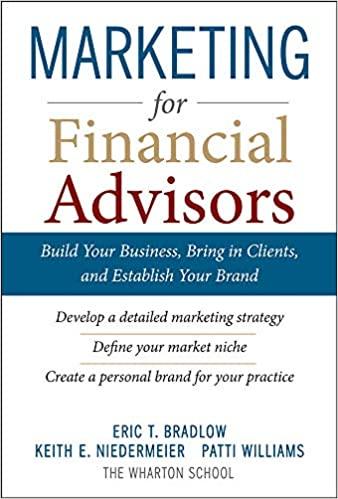Question
Sally is looking for an investment which will mature in five years and plans to use the amount to finance his daughters university education. He
Sally is looking for an investment which will mature in five years and plans to use the amount to finance his daughters university education. He estimates he will need $500,000 in expenses at that time for his daughters education expenses. His financial advisor presents him with a 5- year structured deposit A. It will earn 1% per annum for the first two years, stepping up to 2% in the 3rd year and 3% in the last 2 years.
(a) How much must he set aside today to be able to have $500,000 in five years time? Calculate the average annual return he will be earning if he invests in A.
(b) His financial advisor presents another structured deposit, B, which has the same return profile but whose return depends additionally on the performance of 3 stocks X, Y, and Z. He will get an additional 5% return at maturity if the prices of all 3 stocks are 10% higher than today. How much does Martin have to pay for this second structured deposit, assuming that all of the 3 stocks are 10% higher at maturity? He still receives $500,000 at maturity. Calculate the average annual return of investment B. In this case, which investment would you recommend, A or B? Justify your choice.
(c) (i)
You are considering an alternative investment C which is a 5-year annuity of $105,000 each year with an interest rate of 2.5% per annum. How much will this investment cost today? If the annual cash flows of $105,000 are reinvested each year at 2.5%, will this be enough to fund Martins daughters education in 5 years time?
(ii) If Martin can choose the amount to receive every year such that he will have exactly $500,000 at the end of 5 years, how much would he need to set aside today to invest in C? How much would the annual payment be in this case?
(d) A fourth investment, D, which is structured to mature with a value of $500,000 at the end of five years and has no interim cash flows, earns 0.45% every quarter. Would this investment be more attractive than the other 3? Support your conclusion with appropriate calculations.
(e) What are the assumptions made when we compared the attractiveness of all these 4 investments?
Step by Step Solution
There are 3 Steps involved in it
Step: 1

Get Instant Access to Expert-Tailored Solutions
See step-by-step solutions with expert insights and AI powered tools for academic success
Step: 2

Step: 3

Ace Your Homework with AI
Get the answers you need in no time with our AI-driven, step-by-step assistance
Get Started


